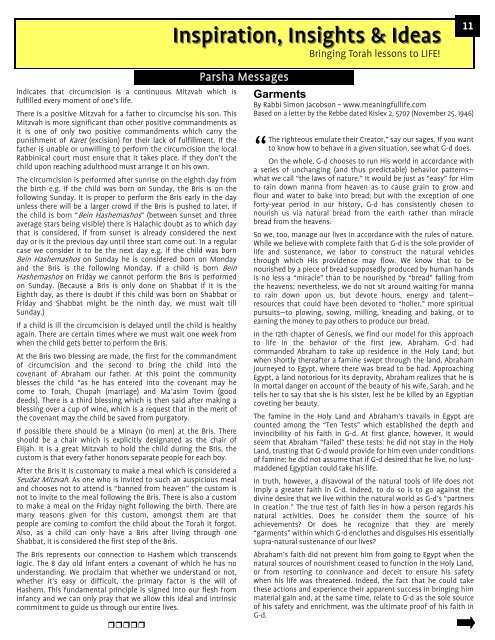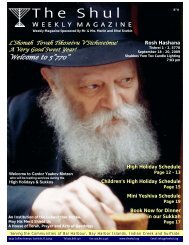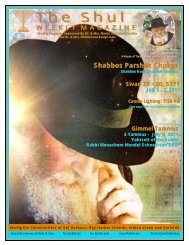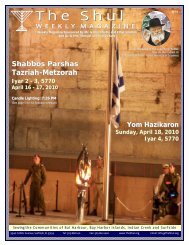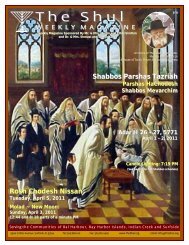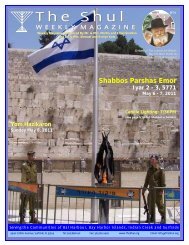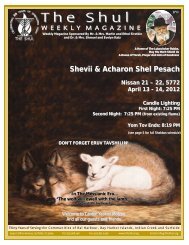Create successful ePaper yourself
Turn your PDF publications into a flip-book with our unique Google optimized e-Paper software.
indicates that circumcision is a continuous Mitzvah which is<br />
fulfilled every moment of one’s life.<br />
There is a positive Mitzvah for a father to circumcise his son. This<br />
Mitzvah is more significant than other positive commandments as<br />
it is one of only two positive commandments which carry the<br />
punishment of Karet (excision) for their lack of fulfillment. If the<br />
father is unable or unwilling to perform the circumcision the local<br />
Rabbinical court must ensure that it takes place. If they don’t the<br />
child upon reaching adulthood must arrange it on his own.<br />
The circumcision is performed after sunrise on the eighth day from<br />
the birth e.g. if the child was born on Sunday, the Bris is on the<br />
following Sunday. It is proper to perform the Bris early in the day<br />
unless there will be a larger crowd if the Bris is pushed to later. If<br />
the child is born “Bein Hashemashos” (between sunset and three<br />
average stars being visible) there is Halachic doubt as to which day<br />
that is considered, if from sunset is already considered the next<br />
day or is it the previous day until three start come out. In a regular<br />
case we consider it to be the next day e.g. if the child was born<br />
Bein Hashemashos on Sunday he is considered born on Monday<br />
and the Bris is the following Monday. If a child is born Bein<br />
Hashemashos on Friday we cannot perform the Bris is performed<br />
on Sunday. (Because a Bris is only done on Shabbat if it is the<br />
Eighth day, as there is doubt if this child was born on Shabbat or<br />
Friday and Shabbat might be the ninth day, we must wait till<br />
Sunday.)<br />
If a child is ill the circumcision is delayed until the child is healthy<br />
again. There are certain times where we must wait one week from<br />
when the child gets better to perform the Bris.<br />
At the Bris two blessing are made, the first for the commandment<br />
of circumcision and the second to bring the child into the<br />
covenant of Abraham our father. At this point the community<br />
blesses the child “as he has entered into the covenant may he<br />
come to Torah, Chupah (marriage) and Ma’asim Tovim (good<br />
deeds). There is a third blessing which is then said after making a<br />
blessing over a cup of wine, which is a request that in the merit of<br />
the covenant may the child be saved from purgatory.<br />
If possible there should be a Minayn (10 men) at the Bris. There<br />
should be a chair which is explicitly designated as the chair of<br />
Elijah. It is a great Mitzvah to hold the child during the Bris, the<br />
custom is that every father honors separate people for each boy.<br />
After the Bris it is customary to make a meal which is considered a<br />
Seudat Mitzvah. As one who is invited to such an auspicious meal<br />
and chooses not to attend is “banned from heaven” the custom is<br />
not to invite to the meal following the Bris. There is also a custom<br />
to make a meal on the Friday night following the birth. There are<br />
many reasons given for this custom, amongst them are that<br />
people are coming to comfort the child about the Torah it forgot.<br />
Also, as a child can only have a Bris after living through one<br />
Shabbat, it is considered the first step of the Bris.<br />
The Bris represents our connection to Hashem which transcends<br />
logic. The 8 day old infant enters a covenant of which he has no<br />
understanding. We proclaim that whether we understand or not,<br />
whether it’s easy or difficult, the primary factor is the will of<br />
Hashem. This fundamental principle is signed into our flesh from<br />
infancy and we can only pray that we allow this ideal and intrinsic<br />
commitment to guide us through our entire lives.<br />
<br />
Inspiration, Insights & Ideas<br />
Bringing Torah lessons to LIFE!<br />
Parsha Messages<br />
Garments<br />
By Rabbi Simon Jacobson ~ www.meaningfullife.com<br />
Based on a letter by the Rebbe dated Kislev 2, 5707 (November 25, 1946)<br />
“<br />
The righteous emulate their Creator,” say our sages. If you want<br />
to know how to behave in a given situation, see what G-d does.<br />
On the whole, G-d chooses to run His world in accordance with<br />
a series of unchanging (and thus predictable) behavior patterns—<br />
what we call “the laws of nature.” It would be just as “easy” for Him<br />
to rain down manna from heaven as to cause grain to grow and<br />
flour and water to bake into bread; but with the exception of one<br />
forty-year period in our history, G-d has consistently chosen to<br />
nourish us via natural bread from the earth rather than miracle<br />
bread from the heavens.<br />
So we, too, manage our lives in accordance with the rules of nature.<br />
While we believe with complete faith that G-d is the sole provider of<br />
life and sustenance, we labor to construct the natural vehicles<br />
through which His providence may flow. We know that to be<br />
nourished by a piece of bread supposedly produced by human hands<br />
is no less a “miracle” than to be nourished by “bread” falling from<br />
the heavens; nevertheless, we do not sit around waiting for manna<br />
to rain down upon us, but devote hours, energy and talent—<br />
resources that could have been devoted to “holier,” more spiritual<br />
pursuits—to plowing, sowing, milling, kneading and baking, or to<br />
earning the money to pay others to produce our bread.<br />
In the 12th chapter of Genesis, we find our model for this approach<br />
to life in the behavior of the first Jew, Abraham. G-d had<br />
commanded Abraham to take up residence in the Holy Land; but<br />
when shortly thereafter a famine swept through the land, Abraham<br />
journeyed to Egypt, where there was bread to be had. Approaching<br />
Egypt, a land notorious for its depravity, Abraham realizes that he is<br />
in mortal danger on account of the beauty of his wife, Sarah, and he<br />
tells her to say that she is his sister, lest he be killed by an Egyptian<br />
coveting her beauty.<br />
The famine in the Holy Land and Abraham’s travails in Egypt are<br />
counted among the “Ten Tests” which established the depth and<br />
invincibility of his faith in G-d. At first glance, however, it would<br />
seem that Abraham “failed” these tests: he did not stay in the Holy<br />
Land, trusting that G-d would provide for him even under conditions<br />
of famine; he did not assume that if G-d desired that he live, no lustmaddened<br />
Egyptian could take his life.<br />
In truth, however, a disavowal of the natural tools of life does not<br />
imply a greater faith in G-d. Indeed, to do so is to go against the<br />
divine desire that we live within the natural world as G-d’s “partners<br />
in creation.” The true test of faith lies in how a person regards his<br />
natural activities. Does he consider them the source of his<br />
achievements? Or does he recognize that they are merely<br />
“garments” within which G-d enclothes and disguises His essentially<br />
supra-natural sustenance of our lives?<br />
Abraham’s faith did not prevent him from going to Egypt when the<br />
natural sources of nourishment ceased to function in the Holy Land,<br />
or from resorting to connivance and deceit to ensure his safety<br />
when his life was threatened. Indeed, the fact that he could take<br />
these actions and experience their apparent success in bringing him<br />
material gain and, at the same time, relate to G-d as the sole source<br />
of his safety and enrichment, was the ultimate proof of his faith in<br />
G-d.<br />
11


